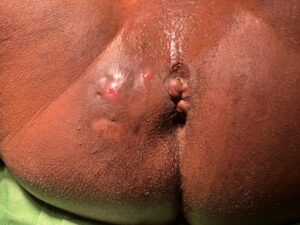Anal Fistula
WHAT IS AN ANAL FISTULA WHO?
Anal fistula, also called fistula – in – ano, is a common distressing disease affecting the anus. It is an abnormal tract that develops from the anus and connects to the skin around the anus. Faecal matter (in small or unrecognisable quantity) pass through this tract and hence the tract does not close spontaneously.
HOW DOES ANAL FISTULA DEVELOP?
Majority of anal fistulae develop from the glands (crepto-glandular) in the anus. The anal glands secret mucus to lubricate the anus during passage of stool. When the valves of these glands fail to function well faeces enter gland to cause infect. An abscess develops which can then track through a number of courses to discharge in the peri-anal skin.
A small number of anal fistulae develop from an ongoing disease process in the anus, eg, trauma with haematoma formation, anal tuberculosis, anal cancer, Ulcerative colitis, etc.
WHO DOES ANAL FISTULA AFFECT?
Anal fistula affects younger people mostly; those who are 30-40 years of age, affecting males more frequently then female in a ratio of about 3-4 : 1
HOW DOES ANAL FISTULA MANIFEST?
Anal fistula present as a peri-anal painful swelling (boil) which ruptures to discharge pus. The resulting ulcer heals over time only for another abscess to develop and discharge.
The patient therefore has scared and indurated area around the anus.
WHAT WILL THE DOCTOR DO WHEN YOU PRESENT WITH ANAL FISTULA?
The doctor will talk to you extensively and then ask you to lie on a couch where he/she will examine you; this will include inserting a gloved figure into your anus.
He/she will ask you to undertake some investigations that will help diagnose the anatomy and course of the tract very well.
WHAT ARE THE INVESTIGATIONS FOR ANAL FISTULA?
- Proctoscopy
- Peri-anal and/or endo-anal ultrasound
- Perineal MRI
- Fistulogram
- Flexible Sigmoidoscopy or Colonoscopy
HOW IS ANAL FISTULA TREATED?
Surgery is the main stay of treating anal fistula. There are many surgical approaches for treating anal fistula and the selection of any of them for any particular fistula is informed by the anatomy and course of the fistula tract in relation to the two anal sphincters. This critical decision must be taken by a proctologist.
DO ANAL FISTULAE RECUR AFTER SURGERY?
Anal fistula is a distressing disease for two reasons: (1) the pain and soiling of the perineum and (2) the high recurrence rate which has a wide variation of between 7- 80%, depending on the centre/hospital reporting?
ARE THERE MAJOR COMPLICATIONS THAT CAN FOLLOW ANAL FISTULA SURGERY?
The anal fistula track goes through the anal sphincters and these are at risk of damage to cause anal incontinence. The incontinence can be of flatus only or both flatus and faeces.
WHO SHOULD DO ANAL FISTULA SURGERY?
The wide range of recurrence reported after surgery for anal fistula is because of the varied range of doctors with different skills and expertise who operate on anal fistula; from medical officers with some experience in surgery, to general surgeons and proctologists. The lowest recurrence rates are reported from proctology centres with high case volumes.
The proctologist is therefore the most qualified person to operate on anal fistula
Prof Jonathan CB Dakubo

